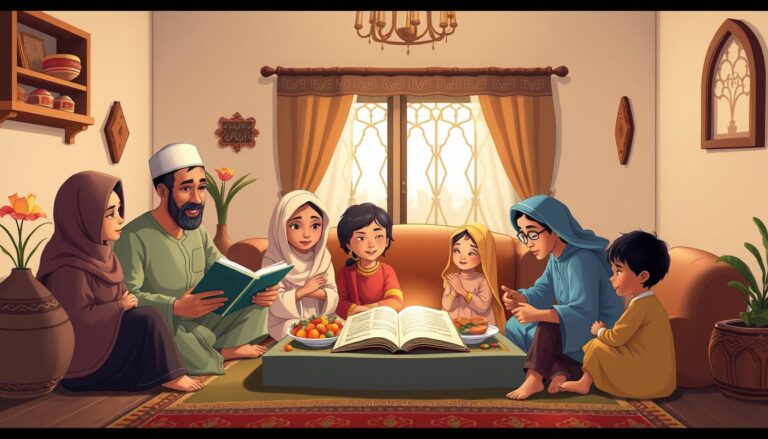5 Beliefs About the Afterlife in Islam
Have you ever thought about what happens after we die? In Islam, the idea of life after death, called Akhirah, is very important. It guides how Muslims live and see their role in the spiritual world.
Islamic eschatology is filled with beliefs about the afterlife. It covers everything from death to the Day of Judgment and the eternal places of Paradise and Hell. Islam gives a clear picture of what’s next for us.
The Quran talks a lot about life after death, showing its big role in Islamic beliefs. This focus on the afterlife motivates Muslims to live righteously. They believe their actions now will decide their future.
Key Takeaways
- Akhirah is a central concept in Islamic faith
- The Quran extensively addresses the afterlife
- Belief in the Day of Judgment influences Muslim behavior
- Paradise and Hell are described in detail in Islamic texts
- Actions in this life determine one’s fate in the hereafter
- Justice and accountability are key themes in Islamic eschatology
- The afterlife provides context for earthly existence
Introduction to Islamic Beliefs About the Afterlife
Islamic beliefs focus on the afterlife, known as Akhirah. This idea shapes how Muslims see their life on earth and what comes next. Knowing about Akhirah is key to understanding Islamic teachings.
The concept of Akhirah in Islam
Akhirah is the eternal world after our life on earth. It’s a central part of Islamic beliefs, showing we’re accountable for our actions. The Quran says our actions affect our spirit, with good deeds helping and bad deeds harming.
Importance of belief in the afterlife for Muslims
Believing in Akhirah is vital for Muslims. It gives them hope, motivates them to act righteously, and shows the value of following the Quran. This belief guides how Muslims live, focusing on eternal happiness over short-term gains.
Life as a divine test
In Islamic teachings, life is seen as a test from Allah. This view encourages Muslims to live with responsibility, knowing their actions matter in the afterlife. The Quran promises fair judgment, showing Allah’s justice.
“Every soul will taste death. And We test you with evil and with good as trial; and to Us you will be returned.” (Quran 21:35)
Grasping these Islamic beliefs about Akhirah and life’s test helps Muslims live with purpose and responsibility.
The Journey of the Soul After Death
In Islamic belief, the soul’s journey after death is complex and deep. It starts the soul’s move from the world we know to the afterlife.
The Role of Azra’il
Azra’il, known as the Angel of Death, is key in this journey. When a person’s time is up, Azra’il takes the soul from the body. This is when the soul’s journey to the afterlife begins.
The State of Barzakh
After death, the soul enters Barzakh. It’s a waiting period before the Day of Judgment. Here, good souls find peace, while others face tests. This stage lets souls think about their lives on earth.
Questioning in the Grave
Questioning in the grave is a big part of the soul’s journey. Two angels, Munkar and Nakir, ask about faith and actions. This shows how important faith and good deeds are.
“Seek forgiveness and perform acts of charity for the deceased, as these can bring blessings in the afterlife.”
Islamic teachings tell us to pray for the dead and do good deeds for them. These actions can help the soul’s journey. They show the connection between the living and the dead in Islam.
5 Beliefs About the Afterlife in Islam
Islamic afterlife beliefs are central to the faith. Muslims believe in five main points about what comes after death. These beliefs help them understand life’s purpose and guide their actions.
The first belief is the soul’s journey after death. Muslims think that when someone dies, the Angel of Death takes their soul. This begins their journey in the afterlife.
The second belief is the Day of Judgment. On this day, everyone will come back to life and be judged for their actions. The Quran says, “Every soul will taste death. Then to Us will you be returned” (29:57).
The third belief is the resurrection of the body. Muslims believe that on the Day of Judgment, bodies will be brought back to life. They will face judgment then.
Paradise, or Jannah, is the fourth belief. It’s seen as a place of eternal bliss for those who lived righteously. On the other hand, Hell, or Jahannam, is the fifth belief. It’s described as a place of suffering for those who disobeyed God or others.
“God created the heavens and the earth for a true purpose: to reward each soul according to its deeds. They will not be wronged” (Quran 45:22).
These beliefs are widely accepted across the Muslim world. In South Asia and Southeast Asia, almost all Muslims believe in Paradise and Hell.
The Day of Judgment (Yawm al-din)
In Islamic belief, Yawm al-din is very important. It’s the end of life on Earth and the start of eternal life. The Quran talks about it over 500 times, showing its key role in faith.
Resurrection of the body
On Yawm al-din, a trumpet will sound, and all souls will come back to life. Bodies will be brought back, and everyone will face divine justice. The Quran talks about this a lot, showing its big role in Islamic beliefs.
Standing before Allah for judgment
After coming back to life, everyone will stand before Allah. This moment of judgment is described in Islamic texts. Each person’s actions will be judged, deciding their afterlife.
Accountability for earthly actions
On Yawm al-din, everyone will be judged for what they did on Earth. The Quran says living a good life is key, as all actions will be judged. This belief pushes Muslims to live righteously and do good deeds.
“The opening chapter of the Qur’an introduces Allah as the Owner of the Day of Retribution, emphasizing the significance of belief in the Last Day.”
Understanding Yawm al-din is key for Muslims. It shows life on Earth is short and our actions have eternal consequences. This belief encourages living a life of faith, kindness, and following Islamic teachings.
Paradise (Jannah) in Islamic Belief
Jannah is the Islamic concept of Paradise, a place of eternal bliss and heavenly rewards. The Quran talks about Jannah 147 times, showing its importance. It is described as a realm of unmatched beauty and joy.
Islamic tradition talks about seven levels of Heaven, each more beautiful than the last. These levels are made of materials like silver and divine light. The higher levels are seen as more desirable, showing the different levels of righteousness among believers.
The Quran vividly describes Jannah’s delights:
- Rivers of pure water, milk, wine, and honey
- Abundant fruits of every kind
- Fine green silk and gold embroidery for clothing
- Silver bracelets as adornments
- Immortal youths serving crystal cups
To enter Jannah, one must live a devoted life and do good deeds. The Quran lists qualities for its inhabitants, like faith, truthfulness, and generosity. While there’s debate on the exact entrance criteria, the promise of Jannah motivates Muslims to live righteous lives.
Abu Sa’eed Al-Khudri narrated that people in Paradise will look at the dwellers of lofty mansions like looking at a brilliant star in the horizon.
This hadith shows the luxury in Jannah, where the most pious have the highest status. The idea of Jannah in Islam gives believers a glimpse of eternal joy. It inspires them to strive for spiritual excellence in this life.
The Concept of Hell (Jahannam) in Islam
In Islam, Jahannam is seen as the ultimate punishment for those who ignore Allah’s guidance. It motivates Muslims to live righteously and avoid sin.
Description of Hell in the Quran
The Quran describes Jahannam as a place of severe suffering. It has seven levels, each worse than the last. People there suffer from thirst, hunger, and torment.
The punishments are focused on how things feel on the skin and in the stomach. Imagine being boiled in water or melted in brass.
Purpose of Hell in Islamic theology
Jahannam is a warning in Islamic teachings. It shows what happens when you disobey Allah. The contrast between Jahannam and Paradise (Jannah) stresses the value of faith and good deeds.
Possibility of redemption from Hell
Islamic scholars have different views on escaping Jahannam. Some think Muslims can leave, but others believe it’s permanent for non-Muslims. This shows Allah’s mercy and chance for forgiveness.
This idea encourages Muslims to seek forgiveness and live righteously, even after mistakes.
“Verily, Allah forgives all sins. He is Oft-Forgiving, Most Merciful.” – Quran 39:53
Understanding Jahannam makes Muslims realize the seriousness of their actions. It reminds them of the importance of following Allah’s guidance.
The Role of Faith and Good Deeds in Determining the Afterlife
In Islam, faith and good deeds are key to salvation. Muslims believe their actions in life affect their fate after death. This belief encourages followers to live virtuous lives and grow spiritually.
The Quran says faith alone is not enough. Good deeds must also be done for a Muslim to reach Paradise. This idea is central in Islamic teachings and guides believers’ daily lives.
- Faith in the afterlife is one of six core Islamic beliefs
- Deeds will be weighed on Judgment Day
- Paradise awaits those with strong faith and righteous actions
Muslims try to balance their faith with actions. They aim to follow the Quran, do good deeds, and seek Allah’s forgiveness. This approach values both personal belief and making a positive impact on society.
“The best among you are those who bring greatest benefits to many others.” – Prophet Muhammad
Research shows many Muslims worldwide believe in the afterlife. In some countries, over 90% of Muslims believe in Paradise and Hell. This belief motivates them to focus on both faith and good deeds every day.
Islamic Views on Suicide, Euthanasia, and Unjust Murder
Islam values life greatly. It teaches that life is a gift from Allah, and only He decides when it ends. This belief influences Islamic views on suicide, euthanasia, and unjust killing.
Prohibition of Taking One’s Own Life
Suicide is strictly forbidden in Islam. The Qur’an says causing death unjustly is like killing everyone. Despite suicide rates rising by 65% in 45 years, Islam teaches life’s value and encourages seeking help in hard times.
Stance on Assisted Dying
Euthanasia is also banned in Islam. Active euthanasia is seen as against divine will. Yet, Islamic scholars allow stopping futile treatments when they no longer help the patient.
Consequences of Unjust Killing
Islam strongly condemns unjust murder. It teaches that human life is the most precious. Muslims believe those who unjustly kill will face harsh punishment in the afterlife, showing life’s high value in Islam.
“Do not kill yourselves, for Allah is merciful to you.” – Qur’an 4:29
These teachings highlight Islam’s belief that life is sacred and must be protected. Muslims are urged to value and cherish life, even in tough times, trusting in Allah’s wisdom and mercy.
Interaction Between the Living and the Dead in Islamic Tradition
Islamic teachings shed light on the bond between the living and the dead. Though direct talks with the deceased are not common, Muslims find ways to stay connected spiritually. This connection is through practices that honor their loved ones who have passed away.
Ziyarat, or visiting graves, is a key practice for Muslims. It reminds them of their own mortality and lets them pray for the souls of the deceased. These visits make the spiritual realm feel closer, offering comfort to those who mourn.
Some Muslim scholars delve into the world of spirits and their possible interactions with the living. The Quran talks about a separation called Barzakh between the living and the dead. Yet, traditions suggest there might be a limited connection. For instance, Turkish Muslims believe a soul can stay near its body for a few days after death.
“When the soul is taken out, the eyesight follows it.”
This hadith from Sahih Muslim points to a deep moment when the soul leaves. It’s thought that good souls might visit others or even go to lower realms. But, these ideas are open to different views among Islamic schools.
Though talking to the deceased is not encouraged, Muslims find comfort in praying for their loved ones. This spiritual bond offers solace and strengthens the belief in the temporary nature of separation, as Islamic teachings say.
Preparing for the Afterlife: Islamic Guidance
Islam offers clear guidance on preparing for the afterlife. This includes living righteously, seeking forgiveness, and keeping faith until death. The idea of akhirah, or eternal life after death, is key in Islamic beliefs.
Importance of Last Words
In Islamic tradition, a person’s final words are very important. Many Muslims try to say the Shahada, the statement of faith, as their last words. This is seen as a strong declaration of belief in Allah and His messenger.
Living a Righteous Life
Islamic teachings stress the need for righteous living. This means:
- Doing good deeds
- Following Islamic rules
- Treating others with kindness and respect
- Completing religious duties
These actions help ensure a good outcome on the Day of Judgment. There, each soul’s deeds will be judged.
Seeking Forgiveness and Repentance
Repentance is vital in Islamic teachings for the afterlife. Muslims are urged to seek Allah’s forgiveness often. This act of repentance is seen as a way to cleanse the soul and improve one’s standing in the hereafter.
“Verily, Allah loves those who repent and those who purify themselves.” – Quran 2:222
By following Islamic teachings, living righteously, and seeking forgiveness, Muslims prepare for the afterlife. They aim to reach eternal bliss in Jannah (Paradise).
Conclusion
Islamic eschatology is filled with deep beliefs about the afterlife. These beliefs guide Muslims all over the world. They teach the importance of living a life that follows Islamic values, always thinking about the day of judgment.
The path of death, resurrection, and judgment is central to Islamic beliefs. Muslims aim for paradise by believing in their faith, doing good deeds, and seeking forgiveness. The Quran’s words on the afterlife motivate Muslims to act ethically and prepare spiritually.
Grasping these afterlife beliefs gives us a peek into the Islamic perspective. It shows the faith’s focus on fairness, kindness, and personal duty. As Muslims face life’s hurdles, their beliefs in the afterlife lead them to be kind, generous, and spiritually growing. This shapes how they act as individuals and as a community.
Source Links
- Akhirah – GCSE Religious Studies Revision Notes
- Belief in Judgement Day11 min read
- Life After Death5 min read
- 3. Beliefs: 5. Life after death
- Life after death
- Life After Death In Islam: The Concept And The 14 Stages Of Afterlife
- Chapter 3: Articles of Faith
- Islamic view of death
- Judgement Day in Islam
- Death & Day of Judgement — LEARN ISLAM
- Mercy and Might on Judgment Day: Allah’s Name Maliki Yawm al-Din | Yaqeen Institute for Islamic Research
- Jannah
- Paradise in Islam – Read the wonders awaiting in Heaven
- Jahannam
- Perspectives on the Afterlife: A Comparative Analysis in Islam, Christianity, and Judaism
- Jahannam – (Religions of Asia) – Vocab, Definition, Explanations | Fiveable
- Belief in Life after Death
- What Does Islam Believe about Resurrection, Judgment, and the Afterlife? by Don Stewart
- Suicide and islamic view
- Death – the terminator of all pleasures
- Part 1: Value of life
- Understanding faith considerations when caring for bereaved Muslims
- Akhirah (the afterlife) – Authority in Islam – GCSE Religious Studies Revision – OCR – BBC Bitesize
- Islam Guide: Life After Death
- Islam – Eschatology, Judgment, Afterlife | Britannica
- Afterlife: is there life after death? – Voice Of Islam Radio
- Muslim beliefs about life after death and how that influences human behaviour (Ethics 1.11)







